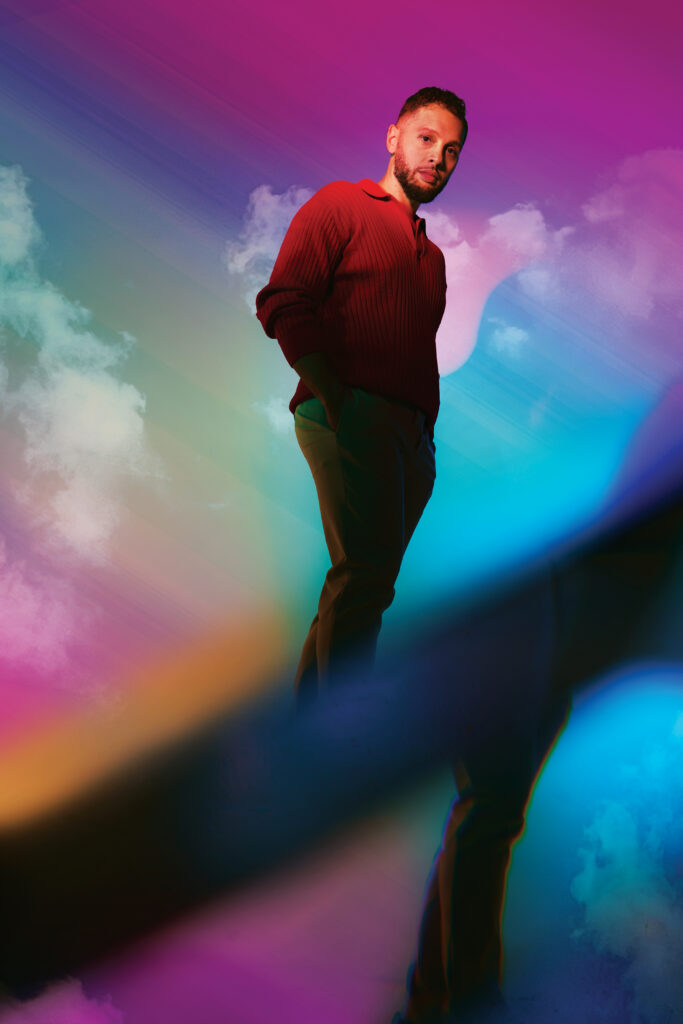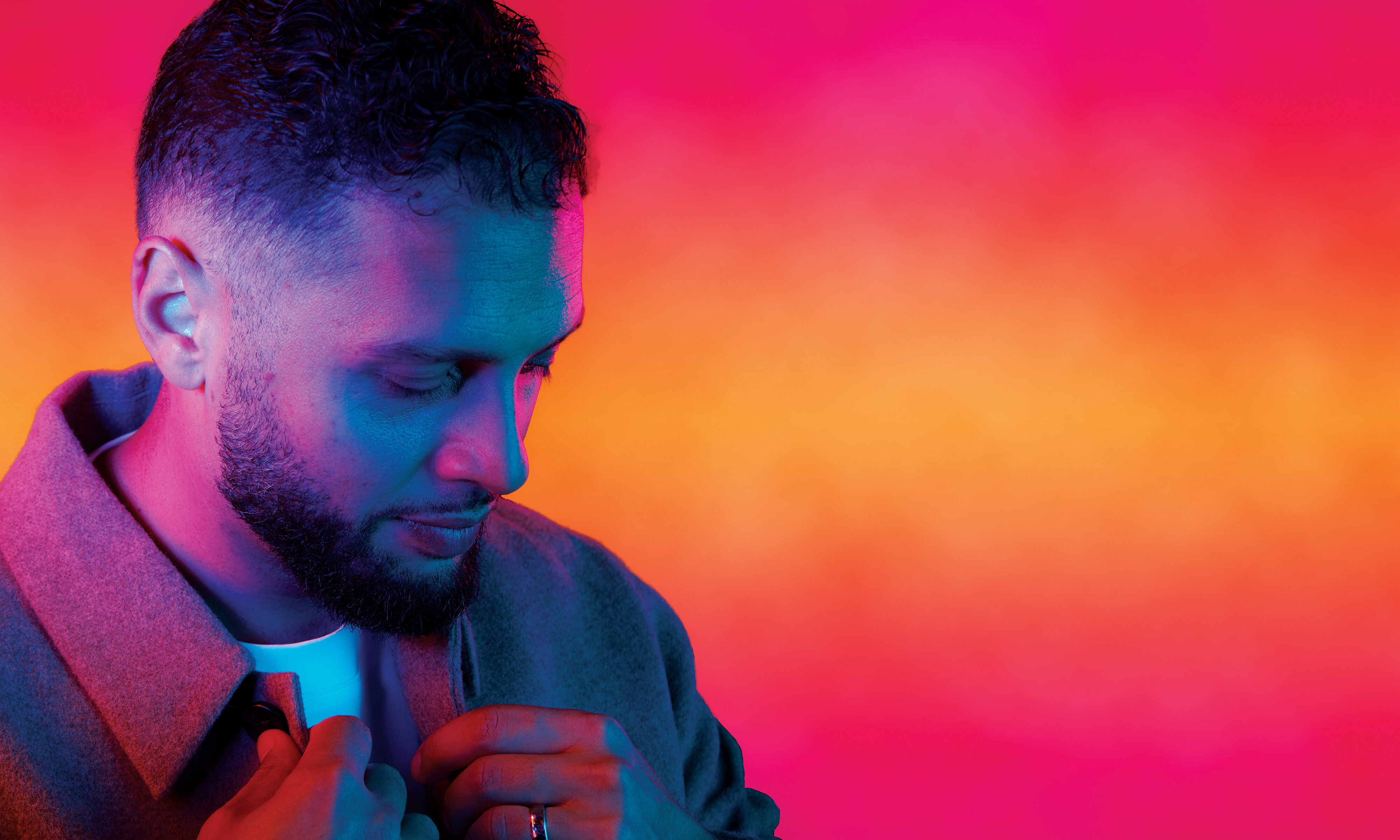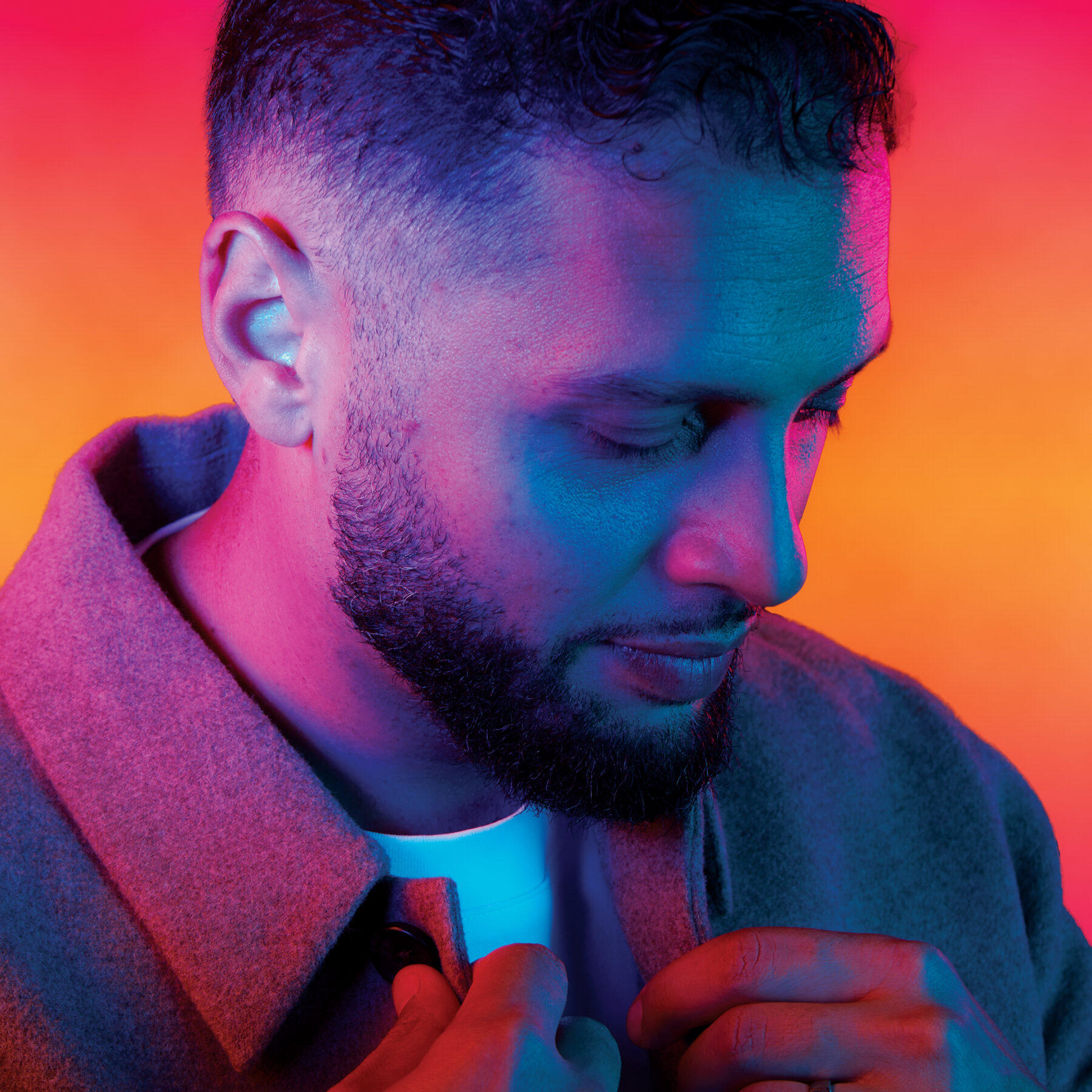When Abdullah Snobar reflects on the many moments that have made him one of the country’s trailblazing tech leaders, a career trajectory that earned him a spot on Canada’s Top 40 Under 40 in 2018, his expression offers hints of who he is and who he’s been. There are glimpses of a wide-eyed and judicious youngest brother who let nothing slip past his notice, and the unshakable discernment of a leader tasked with guiding a team into an exponentially unpredictable future.
Growing up, Snobar surveyed everything around him, especially his twin brothers, Abe and Mo, his elders by two years. The duo was always in his line of sight, and he remembers the qualities he noticed in them that felt distinct from himself. “Courage, noise, extraversion,” he says, settling into a low, plush lounge chair at Rooms Coffee in Toronto. “I was so much more reserved because I was observant most of the time. I almost felt like I had to find a balance between them and me. My brothers, somehow, could never figure out how to hide their steps. I knew how to get away with things because I would watch them. I would learn the recipe for not getting caught.”
Years later, much of his leadership approach has been informed by lessons gleaned not just from his brothers, but also his parents—and his people. Listening to Snobar’s fond reflections of his brothers and parents, Omar and Hana, immigrants twice over whose families fled Palestine for Jordan during the 1948 Nakba, then moved to Canada in the late ‘80s, it’s clear he grew up understanding how to balance an industrious work ethic with a well of empathy. For years, Omar split his time between Jordan, where all three brothers were born, and London, Ont., where the family moved when Snobar was three. As a result, Hana was often solo parenting—and setting high expectations for her sons. When Omar was home, though, his approach was softer, bucking cultural norms.
“My mom always pushed us, and my dad was super sensitive. He would say, ‘Why are we letting them work? They shouldn’t work.’”

To illustrate these different approaches, Snobar, now 37, reminisces about the teenage rite of passage of working at a grocery store. By the time he asked the owner of the local Food Basics to let him gather and replace shopping carts, he’d already sold chocolate bars to neighbours, and spent summers harvesting onions and picking brightly coloured zinnias on a farm outside London—evidence of the diligence his mother had instilled in him. But when he finally landed a job at Food Basics, it was the winter holiday rush, just as temperatures began to plummet. So, knowing an extra pair of hands would shave minutes off the time Snobar’s fingers and toes were exposed to sub-zero temperatures, Omar would park his car in the corner of the lot 30 minutes before the end of Snobar’s shift and join his son collecting abandoned carts.
Snobar internalized these opposite but complementary lessons long ago, implementing them first in his own career then making them the cornerstones of an audacious strategy for redefining how Canadian start-ups flourish. His vision for the DMZ, the No. 1 ranked university-based tech incubator in the world, according to UBI Global, similarly carries the imprint of qualities modelled by his parents. Snobar took the reins of the organization in 2015 as executive director, then became the CEO of DMZ Ventures, the revenue-generating wing of the business, in 2020. Since then, DMZ start-ups — many that defy Silicon Valley’s rigid, and fractured, success formulas — have raised $2.58 billion in seed funding thanks to his, and the incubator’s, direct and indirect support. Positioned as a global enterprise, the DMZ has offices in 10 countries around the world, with a team populated by members of nearly each nation they operate in. Rather than letting hubris drive a desire to stand alone at the finish line, Snobar proposes a re-imagined style of business that fosters success through deliberate tenderness—where an external view can intuit how to support the optimization of processes, or where key performance objectives are paired with an assemblage of tailor-made supports.
He is not the first to propose a more human approach to business. In his 2021 book, The Heart of Business: Leadership Principles for the Next Era of Capitalism, former Best Buy CEO and chairman Hubert Joly details his own transformation from what he describes as a “hard-charging, deeply analytical McKinsey consultant” to a leader who strongly believes in “human magic.” Joly sees business as a “force for good” that can help reshape our world to be more equitable, a mission that feels all the more urgent following the seismic societal shifts caused by the COVID-19 pandemic and recent civil rights advocacy in support of racialized, queer and otherwise marginalized groups. “Like many leaders of my generation, I long believed that emotions were not meant to be shared in a business context,” he writes. “I had a lot to unlearn… [Today,] our employees expect us to be human, and they expect us to grasp who they are and to make them feel respected, heard, understood and included. This means that we have to open up and make ourselves vulnerable, including by acknowledging what we do not know. Brené Brown points out that vulnerability is at the heart of social connection. Social connection, in turn, is at the heart of business.”
It’s not that we don’t want our founders to be great and big, and reach their highest ambitions. It doesn’t mean they need to stop and think small. It means don’t break things on the way
Yet, this philosophy remains relatively rare among executives and investors. That’s why it’s particularly noteworthy that in the metaphorical animal sanctuary the business world has built itself around—where bulls, gazelles, cheetahs, phoenixes and, most importantly, unicorns attract the most attention (and VC funding)—Snobar has bet on the stoic sturdiness of camels. Lacking the flair of their wildlife compatriots, camels are often overlooked and underestimated. “Camels can actually run when they want to go fast,” Snobar tells his founders. “It’s an animal that has resilience, thoughtfulness and shows grit, but is sustainable.”
“Sometimes when you’re building, you’re literally destroying communities,” he explains. “You have to be thoughtful about how everyone around you is impacted. It’s not that we don’t want [our founders] to be great and big, and reach their highest ambitions. It doesn’t mean they need to stop and think small. It means don’t break things on the way.”
The same year that cryptocurrency entered the public lexicon, when a single Bitcoin soared to over US$1,000 in valuation and Edward Snowden’s leak of classified National Security Agency documents revealed the governmental digital surveillance campaigns, the 2013 rollout of Canada’s Start-Up Visa (SUV) reflected the buzz of a rapidly changing tech landscape. As successful new ventures prospered across sectors, bureaucratic support and financing aimed to tap into the momentum that had begun organically. Designed for international entrepreneurs who are either accepted into an incubation program or can garner an investment of at least $200,000 from a designated Canadian venture capital fund, the SUV presented a pathway to permanent residency. Four years later, the introduction of the federal Global Talent Stream program sought to scaffold the program, lengthening the pipeline for highly coveted tech workers to either join an emerging crop of start-ups or fill in gaps in the workforce of existing industries. While the program has hit speed bumps and is only a fraction of the size of its predecessor, the Federal Entrepreneur Program, it has yielded noticeable wins. Formaloo, an Estonian no-code insights platform that emerged from the SUV and was incubated at the DMZ, secured over $2 million in seed funding to further its mission of democratizing app development.
Over a decade later, these programs remain active but the ecosystem around them has drastically shifted. Against the backdrop of far-right nationalist regimes accelerating regional conflicts and the unignorable devastation caused by extreme climate events, the global market finds itself unsettled by an increasingly unpredictable geopolitical storm. A cycle emerges—anxiety from institutional power holders and forecasters encourage countries and corporations to mitigate risk at all costs (including choking off migration opportunities), and this, then, cools the market, driving up interest rates and leading to more conservative economic policies. In turn, investors and entrepreneurs are wary of backing speculative, cutting-edge businesses. As a defensive measure, the International Monetary Fund introduced a set of “policy tests” that recommend funding corporate innovation research and exploring new trade opportunities, to ward off what IMF managing director Kristalina Georgieva identifies as the “Tepid Twenties”—a decade destined to be “sluggish and disappointing” without course correction.

However, policy experts note that while Canada’s 2024 budget allocated significant funding for AI research—a bid to create a welcoming environment for exactly this sort of groundbreaking entrepreneur, whether homegrown or international—it breaks from IMF recommendations and ignores broader structural measures needed to boost productivity and growth by supporting new business ventures. In a joint op-ed for The Globe and Mail published in 2023, then Canadian Chamber of Commerce president Perrin Beatty and political science professors Bessma Momani and Kim Richard Nossal levelled a scathing diagnosis of Canada’s global economic profile: “It has been a long time since we’ve engaged in an honest assessment of how our country performs on the international stage, and why we are increasingly seen by others as unserious,” they wrote.
According to Snobar, this ideological gridlock is rooted in a national identity crisis—one that has yet to identify a way to be “bullish” that doesn’t compromise other values. “We’re very good at a lot of different things, but we undersell ourselves,” he says. “It’s not about just being present and being at the table. It’s about leading the discussions, because we have the best experts on planet Earth. It’s about building the best companies, because we have the greatest talent. The humility, in some cases, is actually working against us, and the complacency is setting us back as a nation in terms of what we’re doing on innovation and productivity.”
The fact is, the same country that has historically branded itself as a haven for newcomers, a reputation it certified with the Multiculturalism Policy of 1971, has struggled to keep pace with and evolve to meet the entrepreneurial desires of a new generation of immigrants. As housing prices and the cost of living continue to soar, newcomers find that establishing a foundation in one of the country’s major metropolises has become increasingly difficult, if not entirely untenable. A 2023 report by the Royal Bank of Canada showed that, on average, Canadians would need to devote 60 per cent of their household income to cover homeownership costs. In an era where working remotely has altered the business landscape and digital nomads bypass city living, Canada has found it hard to retain its appeal.
Frequently overlooked by the country’s giants of industry is an attunement to what users are actually looking for, and an appetite for re-imagining how to best deliver these goods and services to a diverse range of communities.
“I appreciate technology, but I’m not a techie. I’m the guy that’s running a service operation. And this is the common denominator for every job I’ve done in my life: service,” Snobar says.
Canadians very good at a lot of different things, but we undersell ourselves. The humility, in some cases, is actually working against us, and the complacency is setting us back as a nation in terms of what we’re doing on innovation and productivity.
This has meant consolidating what he’s learned from all of the roles he’s held in the past—a hardy army reserve member, an aspiring hotelier and a charismatic cruise ship manager—to champion the principle that how people interact with the services they use is just as important as simply delivering the final product. Which, in essence, serves as the foundational bedrock that many companies started by immigrants have always known to be true. Rather than simply aspiring to disrupt the status quo, sustainable businesses are rooted in appraising the legitimate needs of your community. From independent taxi drivers placing water bottles in their back seats, well before Uber suggested it as an incentive to encourage tips from riders, to owners of specialty food markets curating bundles of ingredients to make it more convenient to prepare specific dishes, a template that meal-subscription companies would later seize, success has long been inextricably tied to financial transactions that deliver intuitive offerings. These innovative practices are inspired by cultivating a form of trust that moves like an elastic band—stretching around businesses built holistically, then snapping when the dynamic becomes asymmetrically beneficial. It’s a feature that this country’s dominating monopolistic enterprises have been able to neglect, but that business ventures led by immigrants have made a priority.
“Immigrants have nothing to lose because they’re starting from zero, but everything to lose because they have people that rely on them to survive,” Snobar says, reflecting on the entrepreneurs the DMZ works with, many of whom are newcomers to Canada. “Doing, learning, listening, understanding, then changing. It’s part of the exercise of asking, ‘Who do we serve?’ The biggest value that our team has seen across the world is trust. People don’t understand the word itself, how far it takes you and how much patience is required. When trust starts to fade away, that’s when you’ve lost the sticking point.”

This principle doesn’t extend only to the companies the DMZ selects and throws their weight behind, but also shows up in how they treat the founders who rely on their incubator for a range of hard and soft supports. These include providing conference rooms for growing teams to show a united front during meetings with investors, and mentors who operate as surrogates for the kind of gut check a young founder might otherwise receive from a well-connected parent or family friend. In the absence of acquiring start-up costs in the form of a surprise inheritance, or doors that can open from intergenerational connections, Snobar constructs workarounds.
“Building anything is super intimidating. You’re [influenced] by your societal circumstances and your cultural circumstances. The things that have been ingrained in your mind as normal are, sometimes, no longer normal on the business side of things,” Snobar explains. There’s a delicacy to teaching this form of entrepreneurial code-switching, one that doesn’t shame new operators for the things they don’t know—nor does it suggest that they shrink or distort to match business practices that don’t reflect their lived experiences. Instead, Snobar invites his founders to figure out how they can show up in full colour and nudge the conversation back into their court.
“If you want to land a big venture capital cheque, that doesn’t mean you have to change who you are. By no means should you ever do that. But you have to think about how to do certain things—everyone has a story and you can’t always separate it from business. You need to build relativity about what is my hardship versus your hardship? Can I relate to you? Can you relate to me?”
That it can be impossible to separate your story from your way of doing business is top of mind for Snobar, especially right now. Since the fall of 2023, the escalating Israel-Palestine conflict and global call for a ceasefire in Gaza has made business as usual increasingly complicated across sectors, including business, tech, academia and the arts.
If you want to land a big venture capital cheque, that doesn’t mean you have to change who you are. By no means should you ever do that. But you have to think about how to do certain things—everyone has a story and you can’t always separate it from business
For Snobar, who is devoted to a more compassionate approach to business and leadership, the sheer scale of human suffering and the rising death toll in Gaza, along with a perception of apathy across his own industry, has had a profound impact on him. But these past 10 months have also clarified something he’s always instinctively understood: the place he is from is not just a part of who he is, it has defined the way he leads.
The many principles he’s painstakingly developed over the years—which have been staples of his public talks and conversations with emerging founders—can be traced directly to his heritage, and the endurance and perseverance of his people. “I’ve never been prouder to be a Palestinian,” he says.
“My values have never changed, [and those begin and end with] human rights. I don’t mind educating people as well. I want to learn. I want to observe. I will always sit down with the opposing view and listen. But the minute we start getting into intentional ignorance and not wanting to know and pushing a different narrative around it, that’s when I’m like, ‘Can you trust me to open up to my lived experiences? My story? My family’s story, and understand my perspective?’” Snobar continues. “I’ve lost friends over the past couple of months. Still, I’m optimistic enough that I recognize that there are nations, organizations and individuals that believe that what’s happening here is wrong.”

Get the
Three from 3
newsletter
Join our global community of sharp, curious thinkers to receive a carefully curated email of the three most important things to read, see and do this week.
Listen and learn.
Tune into Third Culture Leaders, a podcast hosted by our co-founder and publisher, Muraly Srinarayanathas.
Explore how leaders skillfully navigate multiple cultural landscapes, leveraging their diverse backgrounds to drive innovation and change.
He admits that in each new scenario he’s encountered, he’s had to relearn how to navigate situations where the personal and political collide. In 2016, for example, he received an email invitation from then governor general David Johnston to join a 20-person mission trip composed of officials, artists, academics and leaders of key institutions to visit Jordan, Israel and Palestine. The invitation rang with a resounding gravity—unlike the rest of the group, he would not be able to fly to Israel because he holds Palestinian citizenship.
Of course, it was not just a matter of could he go to Israel. It was also about whether he should. The answer to that question came from another member of the party, Dr. Izzeldin Abuelaish, the first Palestinian doctor to receive an appointment in medicine at an Israeli hospital and the author of the 2010 international best-selling book I Shall Not Hate: A Gaza Doctor’s Journey. “I remember asking [Abuelaish], ‘Should we go to these events? Should we shake hands?’ He said, ‘Absolutely. You stand up, you say, “Hi, my name is Abdullah Snobar, Head of the DMZ. Proud Palestinian, great to meet [you].”’ It was a turning point for me. I got to see all of these parts of the country, of my parents’ homeland, that I had never seen before. Now, I’m seeing it for the first time with the protection of the Canadian government. All of a sudden, I had access. That trip changed me in so many different ways.”
His parents were also impacted, he notes. They were in Jordan at the same time, so Johnston invited them to join the delegation for an event. Seeing his worlds overlap like this—witnessing his Palestinian parents honoured by Canadian officials and welcomed by leaders of the country they had to leave—was one of the proudest moments of his life, and yet another reminder that progress, whether personal, professional or political, is rarely a linear process. So, continuing a practice he started as a child, as Abdullah clocked the transformation he was undergoing, he put his new revelation to work. “Everybody wants the end result. Nobody understands the process that went into it. The process itself is never easy. It’s hard. It’s rough. It’s dark. It’s lonely. But it’s what matters to get you to the other side.”
When Snobar speaks of conveying a message that resonates clearly across divides, yet refuses to mince words, it derives from everything he has seen—the accumulation of experiences and insights that have moulded him into one of Canada’s visionary leaders. It is in debt to his grandmother’s urging to sip on olive oil as the elixir to solve all of life’s problems, and evident in the moments spent with his one-year-old son, not to mention the knowledge that the sacrifices he is making for his child will be different from the ones his father made for him. It’s found in the waterfall of open air that gives him a moment of peace on the back of a motorcycle. His is a perspective on innovation that forgoes the allure of merely creating from scratch, but yearns to contribute to rebuilding what has already existed, and centres a form of adaptability and resilience informed by the certainty that life can regrow again and again, even after 76 years of displacement and occupation.
“It’s about failing often, succeeding rarely, but ultimately finding that one connection that makes everything click,” he says, resolute and unflinching, revealing every version of himself that he’s been in the past, and prepared for those that have yet to emerge.

